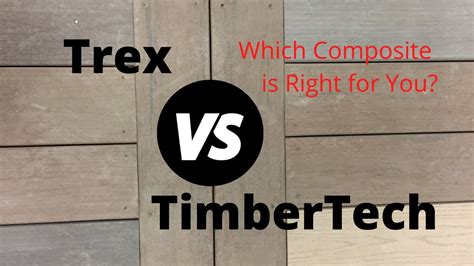When it comes to choosing the perfect decking material for your outdoor space, two popular options often come to mind: Trex and Timbertech. Both brands are well-established and reputable in the industry, but they have some key differences that may make one more suitable to your needs than the other. In this article, we'll delve into the 5 key differences between Trex and Timbertech, helping you make an informed decision for your next decking project.
The Importance of Choosing the Right Decking Material
Before we dive into the differences between Trex and Timbertech, it's essential to understand the significance of selecting the right decking material. Your deck is an extension of your home, providing a seamless transition between indoors and outdoors. A well-designed deck can enhance the aesthetic appeal of your property, increase its value, and provide a comfortable space for relaxation and entertainment.
With so many decking materials available, choosing the right one can be overwhelming. That's why it's crucial to consider factors such as durability, maintenance, cost, and sustainability when making your decision.
1. Materials and Composition
Materials and Composition
One of the most significant differences between Trex and Timbertech lies in their materials and composition. Trex decking is made from a combination of 95% recycled plastic and 5% sawdust, whereas Timbertech decking is composed of 70% recycled plastic and 30% wood fibers.

Trex's unique blend of recycled plastic and sawdust provides exceptional durability and resistance to rot, mold, and mildew. On the other hand, Timbertech's use of wood fibers gives their decking a more natural look and feel.
2. Durability and Lifespan
Durability and Lifespan
Both Trex and Timbertech offer durable decking options, but their lifespans differ slightly. Trex decking is known for its exceptional durability, with a 25-year warranty against rot, mold, and mildew. Timbertech decking, on the other hand, offers a 25-year warranty against defects in workmanship and materials.

While both brands offer impressive warranties, Trex's focus on recycled plastic ensures that their decking remains resistant to wear and tear for a longer period.
3. Maintenance Requirements
Maintenance Requirements
Maintenance is an essential aspect to consider when choosing a decking material. Trex and Timbertech have different maintenance requirements, which may impact your decision.
Trex decking is known for its low maintenance requirements. It resists staining and fading, and cleaning is a breeze with a simple soap and water solution. Timbertech decking, on the other hand, requires more frequent cleaning and may require periodic staining or sealing to maintain its appearance.

4. Cost and Value
Cost and Value
The cost of Trex and Timbertech decking varies, with Trex being generally more expensive. However, the initial cost difference may be offset by the long-term benefits of Trex's durability and low maintenance requirements.

While Timbertech may be more budget-friendly upfront, Trex's durability and long lifespan make it a more valuable investment in the long run.
5. Sustainability and Environmental Impact
Sustainability and Environmental Impact
As consumers become increasingly environmentally conscious, the sustainability of decking materials is becoming a crucial factor in the decision-making process.
Trex decking is made from 95% recycled plastic, which reduces waste and conserves natural resources. Timbertech decking, on the other hand, uses a combination of recycled plastic and wood fibers, which has a slightly lower environmental impact.

While both brands offer sustainable options, Trex's focus on recycled plastic gives it a slight edge in terms of environmental friendliness.
Gallery of Trex vs Timbertech Decking






Frequently Asked Questions
Which decking material is more durable?
+Trex decking is known for its exceptional durability, with a 25-year warranty against rot, mold, and mildew.
Which decking material requires less maintenance?
+Trex decking is low maintenance, resisting staining and fading, and cleaning is a breeze with a simple soap and water solution.
Which decking material is more environmentally friendly?
+Trex decking is made from 95% recycled plastic, reducing waste and conserving natural resources.
In conclusion, while both Trex and Timbertech offer high-quality decking options, the differences between the two brands are significant. By considering factors such as materials and composition, durability and lifespan, maintenance requirements, cost and value, and sustainability, you can make an informed decision that meets your needs and preferences.
Which decking material do you think is right for your next project? Share your thoughts and experiences in the comments below!
